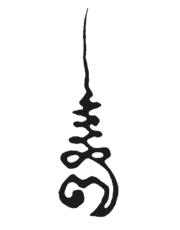Fuang Jotiko
Appearance
(Redirected from Ajahn Fuang Jotiko)
Ajahn Fuang Jotiko | |
|---|---|
 | |
| Personal | |
| Born | 1915[1] |
| Died | 1986 (aged 70–71) |
| Religion | Buddhism |
| Nationality | Thai |
| School | Theravada |
| Lineage | Thai Forest Tradition |
| Organization | |
| Order | Dhammayuttika Nikaya |
| Senior posting | |
| Teacher | Ajahn Lee |
Students | |
| Thai Forest Tradition | ||||||||||||||||||||||||||||||||||||||||
|---|---|---|---|---|---|---|---|---|---|---|---|---|---|---|---|---|---|---|---|---|---|---|---|---|---|---|---|---|---|---|---|---|---|---|---|---|---|---|---|---|
 | ||||||||||||||||||||||||||||||||||||||||
| Bhikkhus | ||||||||||||||||||||||||||||||||||||||||
|
||||||||||||||||||||||||||||||||||||||||
| Sīladharās | ||||||||||||||||||||||||||||||||||||||||
|
||||||||||||||||||||||||||||||||||||||||
| Related Articles | ||||||||||||||||||||||||||||||||||||||||
Ajahn Fuang Jotiko (1915[5] – 14 May 1986[6][7][8][9]) was a Thai Buddhist monk and abbot in the Thai Forest Tradition of Theravada Buddhism.[10]
Fuang was a student of Ajahn Lee[11][12] at Wat Asokaram, a monastery near Bangkok. After Ajahn Lee's death in 1961, Fuang continued at Wat Asokaram where he was expected to become abbot.[13][better source needed] However, in 1965 Fuang left to pursue greater solitude which he felt would improve his meditation practice. About 1971,[13][better source needed] Fuang moved to Wat Thamma Sathit in Rayong Province, where he lived as abbot until his death in 1986.[14] Fuang's students included American monk Ṭhānissaro Bhikkhu,[15][11][12] who studied with him for ten years.[16]
Published works
[edit]- Jotiko, Fuang (1999) [1980]. "A Single Mind". Translated by Bhikkhu, Ṭhānissaro. Barre, MA: Barre Center for Buddhist Studies.
- Jotiko, Fuang (1993). Awareness itself: The teachings of Ajaan Fuang Jotiko. Translated by Bhikkhu, Ṭhānissaro. Valley Center, CA: Metta Forest Monastery. OCLC 46311461.
- Jotiko, Fuang (1999). Awareness itself: The teachings of Ajaan Fuang Jotiko. Translated by Bhikkhu, Ṭhānissaro (Revised ed.). Barre, MA: Barre Center for Buddhist Studies.
- Jotiko, Fuang (1998) [1978]. "Timeless and True". Translated by Bhikkhu, Ṭhānissaro. Barre, MA: Barre Center for Buddhist Studies.
- Jotiko, Fuang (2001) [1984]. "Listen Well". Translated by Bhikkhu, Ṭhānissaro. Barre, MA: Barre Center for Buddhist Studies.
- Jotiko, Fuang; Tanishaluo; Fa yuan bian yi qun (1996). Xi mie zhi shi : a jiang fang de kai shi [When it goes out: Ajaan Fuang's instructions] (in Chinese). Fa yun. ISBN 957-99702-7-0. OCLC 818442585.
Citations
[edit]- ^ Bhikkhu, Thanissaro (2005). Awareness Itself (PDF) (2nd ed.). Metta Forest Monastery. p. 4. Archived from the original (PDF) on 2021-03-30. Retrieved 11 May 2021.
- ^ Bhikkhu, Thanissaro (2005). Awareness Itself (PDF) (2nd ed.). Metta Forest Monastery. p. 4. Archived from the original (PDF) on 2021-03-30. Retrieved 11 May 2021.
- ^ "The Thai Forest Traditions". Archived from the original on 10 April 2022. Retrieved 11 May 2021.
- ^ Bhikkhu, Thanissaro (2005). Awareness Itself (PDF) (2nd ed.). Metta Forest Monastery. p. 6. Archived from the original (PDF) on 2021-03-30. Retrieved 11 May 2021.
- ^ Jotiko 1993, p. 10.
- ^ "Ajaan Lee Dhammadharo on Facebook". Facebook. Archived from the original on 2022-04-27.[user-generated source]
- ^ "The Thai Forest Traditions". Archived from the original on 10 April 2022. Retrieved 11 May 2021.
- ^ Bhikkhu, Thanissaro (2005). Awareness Itself (PDF) (2nd ed.). Metta Forest Monastery. p. 6. Archived from the original (PDF) on 2021-03-30. Retrieved 11 May 2021.
- ^ Shankman 2008, p. 129.
- ^ Strong 2002, p. 353.
- ^ a b Ajahn Lee 1991.
- ^ a b Falk 2015, p. 16.
- ^ a b Wat Asokaram 2004.
- ^ Bullitt 1999.
- ^ Lopez 2016, p. 71, 152, 174.
- ^ Ṭhānissaro Bhikkhu 2013, p. 6.
References
[edit]- Ajahn Lee (1991). The Autobiography of Phra Ajaan Lee. Translated by Bhikkhu, Ṭhānissaro. Wat Asokaram. ASIN B000LUNY52. hdl:2027/mdp.39015041721310. OCLC 41048944.
- Falk, Jordi (2015). The Jhānas: A Comparison of Teachings on Absorption Concentration in the Theravadan Tradition (PDF) (BA). Bates College. Archived from the original (PDF) on 2020-02-23. Retrieved 2020-02-23.
- Lopez, A.R. (2016). Buddhist Revivalist Movements: Comparing Zen Buddhism and the Thai Forest Movement. Palgrave Macmillan US. ISBN 978-1-137-54086-7.
- Shankman, R. (2008). The Experience of Samadhi: An In-depth Exploration of Buddhist Meditation. Shambhala. ISBN 978-0-8348-2401-0.
- Strong, J.S. (2002). The Experience of Buddhism: Sources and Interpretations. Religion Series. Wadsworth/Thomson Learning. ISBN 978-0-534-54175-0.
- Ṭhānissaro Bhikkhu (2013). With Each & Every Breath: A Guide To Meditation (PDF). Valley Center, CA: Metta Forest Monastery. p. 6. Archived from the original (PDF) on 2020-06-25. Retrieved 2020-02-24.
- Bullitt, John (23 November 1999). "Thai Forest Traditions". Access to Insight. Archived from the original on 24 January 2000.
- "Wat Asokaram". DhammaThai.org. A guide to meditation centres in Thailand. Archived from the original on 9 September 2004.
{{cite web}}: CS1 maint: unfit URL (link)
Further reading
[edit]- Bhikkhu, Ṭhānissaro (2006). "Jhana Not by the Numbers". Purity of Heart. Essays on the Buddhist path. Metta Forest Monastery. ASIN B0021EGVQA. OCLC 262847464.
External links
[edit]
